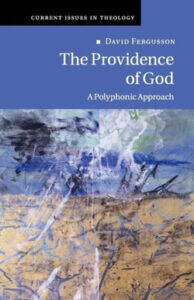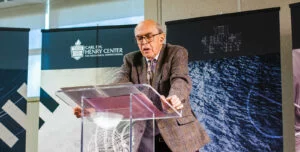The doctrine of providence is harried on many fronts. Horrendous evil, human freedom, modern science, pastoral abuses, and the diverse witness of Scripture each challenge theologians, who seek to present providence. David Fergusson enters this fray with his recent release The Providence of God: A Polyphonic Approach (Cambridge University Press, 2018).
Fergusson presents a cumulative case for reassessment of the doctrine into a multi-dimensional and dispersed polyphonic account affirming the diverse and pluriform action of the triune God centered upon Christ, pneumatologically enacted, and awaiting fulfilment, which retains and adjusts earlier categories such as sustenance, concursus, and governance, without overly constraining or systematizing. Capacity for lament, drive for political engagement, impetus to pray, openness to scientific endeavour, room for “resistance, redemption, and promise” (p. 301) are all essential fruit of Fergusson’s account in his push for theology manifest in lived religion. To this end, Fergusson presents an introduction, followed by five chapters progressing historically from Greek philosophy and Scripture through to current science and theology, then a final chapter that offers a substantial summary and outworking of his position.
A Greek Heritage
The opening portrays a heritage of Platonism and Stoicism dominating over the authority of Scripture, which contains a host of related concepts but not the word providence itself in relation to God. This scriptural diversity undergirds Fergusson’s strong objection to “allowing one model to dominate or exclude others” (p. 21). Providence, then, should describe rather than singularly prescribe the multi-faceted relation of God to creation, which includes a strong account of general providence, upholding of creation by God’s “two hands,” and a compatible account of divine sovereignty and human agency in accomplishing God’s ends. Divine improvisation, struggle, and wrestling that encounters setbacks and threat take the spotlight, so that the covenantal shape of the God-world relation depicts asymmetrical co-dependence. In this, Fergusson skirts synergism and Pelagianism as he makes space for “prayer, obedience, rebellion, forgiveness, redemption and blessing” (p. 35). Likewise, Fergusson affirms the centrality of Christ to creation and salvation but demands ongoing plurality, because Scripture presents providence as general, universal, particular, hidden, contested, and incomplete.
In the early church, this scriptural account contrasts with fate but is closely positioned with Stoic beliefs, so that Augustine’s trajectory towards determinism and passivity dominates Western thought:
There is a single divine blue-print that is enacted in the history of the world, each event and entity being assigned its proper place. This produces patterns of redemption and punishment whereby the truly virtuous are rewarded in heaven while the sinful masses are consigned to their righteous damnation. Divine providence is perceived in a single chiaroscuro of light and darkness, good and evil, melody and discord (p. 50).
Fergusson laments this and advocates for more Eastern elements of mystery, permissive divine willing, and human freedom, which is implicitly understood in a libertarian sense of being able to do otherwise contingently and not driven by divine necessity: “While the outcomes of choice are bound by a providential order, our free decisions are not themselves fated” (p. 55).
The “Latin Default Setting”
The maximalist “Latin default setting,” characterized by figures such as Augustine, Boethius, Aquinas, Zwingli, Calvin, and Turretin in the next chapter, sweeps away uncertain elements and in response Fergusson expresses discomfort with primary and secondary causality, which either does too much or too little, and he likewise retreats from housing providence within the locus of creation or the doctrine of God, which overly restricts its scope. Fergusson appreciates elements of the tradition such as compatible accounts of divine and human agency as well as the flexibility of middle knowledge in contrast to meticulous providence,Ironically, if God is responsible for everything then God does nothing untoward, and hence the status quo is divinely sanctioned. an exclusive emphasis on the Father, and the removal of chance, which he finds constricting. Fergusson exposes flaws he sees in this tradition by examining the practical outcomes of confessions, catechisms, liturgy, and practice, in private and public life, which lack struggle, improvisation, lament, resistance, and over-spiritualize the everyday because creation’s integrity and goodness are undervalued.
Chapter 3 traces the legacy of this Latin trajectory into the increasing rationalism and generalization of deism, accompanied by a lack of lament, activism, and hope as eschatology is erased by an overwhelming drive from natural philosophy. As exemplary of these outcomes, Alexander Pope’s confirmation that what is is right, Voltaire’s skepticism, and Wesley’s calls for repentance, provide contrasting responses to the devastating Lisbon earthquake. The tendency to equate natural and social processes with the will of God is further illustrated by profiling theological justifications of imperialism, slavery, and free trade, where over-confidence in God’s complete direction could functionally remove divine action from the public sphere; ironically, if God is responsible for everything then God does nothing untoward, and hence the status quo is divinely sanctioned. Fergusson argues that scriptural diversity, resistance, and redemption are required rather than the privatization of religion.
Divine Action and Modern Science
Fergusson then displays keen insight and deft navigation of contemporary concerns as providence and modern science come into conversation in chapter 4, as he warns of equivocal definitions of contingency, randomness, chance, determinism, and teleology. His conclusions are unsurprising given earlier critiques, for example: exploring determinism displays a preference for appropriating MolinistUnder these larger conceptual concerns, Fergusson tackles Darwinism and argues for a broad compatibility of evolutionary science with a chastened theology of providence. middle knowledge; and examining divine temporality supports strong rejection of the “block universe,” where all is determined.
Fergusson argues for an indeterminate universe and a version of divine temporality, within which randomness and chance, whether quantum, chaotic, or human choice, may take their place. Under these larger conceptual concerns, Fergusson tackles Darwinism and argues for a broad compatibility of evolutionary science with a chastened theology of providence, which retains divine purpose (ultimate teleology without meticulous determinism), divine goodness in the face of “surd elements” (theodicy not solely borne by natural philosophy), and human dignity (without undue anthropocentrism).
An excursus follows that gives special attention to divine action, which Fergusson bounds by deism on the one hand and occasionalism on the other. He prefers Farrer’s account of double agency where God works in nature and human agents without a perceptible causal joint, and argues for divine permission rather than strict concursus towards God’s success in new creation, which may be accomplished surprisingly and disruptively such as Christ’s resurrection.
The Risk of Cacophony
Chapter 5 opens with the claim that the twentieth century lost confidence in providentialism as, in the face of trench warfare and the Shoah, theodicy “was denounced as morally dubious” (p. 242), and both stress on creaturely freedom and commitment to natural explanation drove providence from view. Four reactions are outlined: repristination of traditional views (Garrigou-Lagrange, Berkouwer); open or relational theism (process theology, Sanders, Oord);Not everyone will agree with Fergusson’s conclusions, but he raises questions that contemporary accounts of providence cannot ignore, and in this he does service to all seeking to trust, love, and await the God who provides. generalization of providence (Wiles, liberal theology); and Christological determination of providence (Barth). Fergusson prefers to pick and choose elements from each to create a pluriform, ad hoc, and dispersed account with contaminant risks of “de-systematising” and incoherence, but the advantage of avoiding “inflated claims and bad practice” (p. 246).
Finally, Fergusson presents his “systematic unsystematic” theology of providence and distributes the work of providence across the three articles to develop a fuller portrait of Father, Son, and Spirit acting in the world. Continually haunted by theodicy and cries for human freedom, Scripture, worship, and Christian practice are prioritized over coherence, even as it remains desirable. Fergusson risks cacophony for the sake of a providential polyphony livable in practical theology by prayer, in politics, and through suffering.
Fergusson adeptly surveys a breadth of material across more than 2,000 years and a sweep of disciplines including philosophy, biblical studies, systematic theology, science, philosophy of science, history, and both individual and political piety. He genuinely pushes for adaptation in the face of difficulties while also retaining long-held nuances and categories that have shown their usefulness. Those holding to singular comprehensive and meticulous accounts of providence stand squarely within Fergusson’s gaze and may be uncomfortable with its intensity; likewise, those throwing themselves upon the Spirit of freedom, without regard to Father and Son are equally confronted. Fergusson is sympathetic to the strengths of the tradition and contemporary responses, even while asking sharp questions and illuminating challenges. This is not innovation for innovation’s sake, but an attempt to stand within a tradition while heeding the lessons of history, the questions of the age, the demands of the life of faith, and Scripture. As he puts it, “This project is one of criticism and recovery” (p. 11). Not everyone will agree with Fergusson’s conclusions, but he raises questions that contemporary accounts of providence cannot ignore, and in this he does service to all seeking to trust, love, and await the God who provides.








Comments
Be the first one to make a comment!